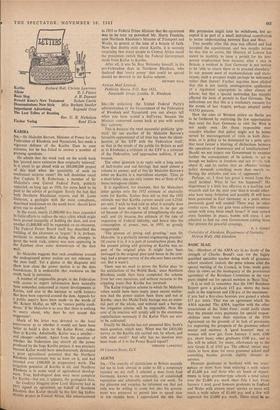Kariba Richard Hall, Christie Lawrence Aliens D. J. Finney Basic
Slag A. H. Dunnett
Ronald Knox's New Testament Robert Currie
Demonstrators: New Style Miss Barbara Smoker Impertinent Advertising Reginald Gray The Lost Tribes of Reading Rev. G. H. Nicholson Fischer Verlag Rene Elvin KARIBA Stn,--Sir Malcolm Barrow, Minister of Power for the Federation of Rhodesia and Nyasaland, has made a vigorous defence of the Kariba Dam in your columns, but he has failed to answer a number of pressing questions.
He admits that the weak rock on the south bank has 'proved more extensive than originally believed.' Is it usual to go ahead with an £80,000,000 project of this kind when the possibility of such an unpleasant surprise exists? He will doubtless recall that Captain F. B, Robertson; a member of Sir Malcolm's own United Federal Party, publicly appealed, as long ago as 1956, for more heed to be paid to the advice of geologists Surely the fact that both Northern Rhodesian experts and M. Louis Dubertet, a geologist with the main consultants, described weaknesses on the south bank should have given rise to doubts?
In the event, nearly £1,000,000 has been expended in futile efforts to replace the mica schist which might have proved incapable of holding the dam, and now another £1,800,000 will be expended on an abutment. The Federal Power Board itself has described the building of the abutment as 'urgent.' It is, perhaps, pertinent to mention that during the attempts to grout the weak rock, cement was seen appearing in the Zambesi three miles downstream of the dam Sir Malcolm suggests that rock conditions around the underground power station are not relevant to the dam itself. Yet a glance at the diagrams will show how close the power station is to the dam foundations. It is undeniable that weakness on the south bank is extensive.
A number of responsible people in the Federation with access to expert information have naturally been somewhat concerned at recent developments at Kariba, and also at the increase in earth tremors that have been reported around the dam. Appeals for a public inquiry have been made—in the words of Mr. Robert Moffat, an MP, to `restore public confi- dence.' If Sir Malcolm is so sure that there is nothing to worry about, why does he not accept this suggestion?
Much of his letter was devoted to the local Controversy as to whether it would not have been better to build a dam on the Kafue River, rather than at Kariba. Admittedly, Kafue was a smaller— and cheaper—scheme. Apart from the question of whether the Federation can absorb all the power produced by the huge Kariba project, it was precisely because Kafue would have simultaneously developed a great agricultural potential that the Northern Rhodesia Government was so keen on it, and had invested over £500,000 in preparatory work. The irrigation potential of Kariba is nil, and Northern Rhodesia is in acute need of agricultural develop- ment. True, hydrological data were more complete for Kariba—but not, it appears, the geological data.
Sir Godfrey Huggins (now Lord Malvern) had in 1953 signed an agreement on behalf of Southern Rhodesia that Kafue should be the first big hydro- electric project in Central Africa. His announcement
in 1955 as Federal Prime Minister that the agreement was to be torn up provoked Mr. Harry Franklin, now Northern Rhodesia's Minister of Transport and Works, to protest at the time of a breach of faith. Now that doubts exist about Kariba, it is scarcely surprising that many people in Central Africa recall the precipitate switch that the Federal Government made from Kafue to Kariba.
After all, it was Sir Roy Welensky himself, in his pre-Federation days in Northern Rhodesia, who declared that 'every penny' that could be spared should be devoted to the Kafue scheme.
Publicity House, P.O. Box 1421, Newcastle Street, Lusaka, N. Rhodesia










































 Previous page
Previous page